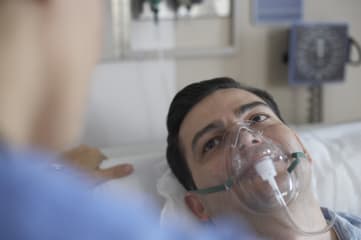
What is it?
An arterial blood gases (ABG) test is a blood test. It measures the acid-base balance (pH) and the levels of oxygen and carbon dioxide in the blood. It uses blood drawn from an artery. This is where the levels of oxygen and carbon dioxide can be measured before they enter body tissues.
Why is this test done?
An arterial blood gases test is done to check for severe breathing and lung problems. The test also checks how well treatments for lung problems are working. And the test can look for changes in how well your lungs, heart, or kidneys are working.
How do you prepare for the test?
- If you take a medicine that prevents blood clots, your doctor may tell you to stop taking it before your test. Or your doctor may tell you to keep taking it. (These medicines include aspirin and other blood thinners.) Make sure that you understand exactly what your doctor wants you to do.
- Tell your doctor ALL the medicines, vitamins, supplements, and herbal remedies you take. Some may increase the risk of problems during your test. Your doctor will tell you if you should stop taking any of them before the test and how soon to do it.
- Do not smoke just before the test or breathe secondhand smoke.
How is the test done?
A health professional uses a needle to take a blood sample. It's usually taken from the inside of the wrist. But it can also be taken from an artery in the groin or on the inside of the arm above the elbow crease.
How does having an arterial blood gases (ABG) test feel?
Collecting blood from an artery is more painful than collecting it from a vein. That's because the arteries are deeper and are surrounded by nerves.
Most people feel a brief, sharp pain as the needle to collect the blood sample enters the artery. If you get a local anesthetic, you may feel nothing at all from the needle puncture. Or you may feel a brief sting or pinch as the needle goes through the skin.
What happens after the test?
- You may be able to go home right away.
- You may be told to avoid lifting or carrying heavy objects for 24 hours after you've had blood drawn from an artery.
Follow-up care is a key part of your treatment and safety. Be sure to make and go to all appointments, and call your doctor if you are having problems. It's also a good idea to keep a list of the medicines you take. Ask your doctor when you can expect to have your test results.
Where can you learn more?
Go to http://www.healthwise.net/patientEd
Enter P940 in the search box to learn more about "Arterial Blood Gases (ABG) Test: About This Test".
Current as of: September 25, 2025
Author: Ignite Healthwise, LLC Staff
Clinical Review Board
All Ignite Healthwise, LLC education is reviewed by a team that includes physicians, nurses, advanced practitioners, registered dieticians, and other healthcare professionals.

